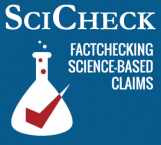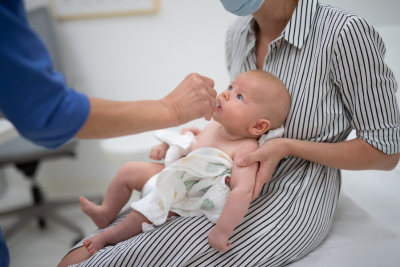Este artículo estará disponible en español en El Tiempo Latino.
Health and Human Services Secretary Robert F. Kennedy Jr. has a long history of undermining confidence in vaccine safety, including by repeatedly claiming that vaccines are not tested in placebo-controlled trials, a familiar anti-vaccine trope.
Now, an HHS spokesperson has used similar language in a statement that falsely said there’s little available evidence on whether vaccines are safe.

“Except for the COVID vaccine, none of the vaccines on the CDC’s childhood recommended schedule was tested against an inert placebo, meaning we know very little about the actual risk profiles of these products,” the HHS spokesperson told the Washington Post. Other journalists also have published the statement.
The spokesperson also appeared to suggest a policy change and misleadingly said: “All new vaccines will undergo safety testing in placebo-controlled trials prior to licensure — a radical departure from past practices.”
It’s incorrect that there is little information on childhood vaccine safety. Vaccines approved by the U.S. Food and Drug Administration undergo testing for both safety and efficacy prior to approval, and their safety and effectiveness are also monitored after they are released to the public. Post-approval safety monitoring has rapidly detected very rare vaccine side effects that clinical trials are not large enough to identify.
Some current vaccines were indeed tested against a placebo, such as the rotavirus vaccines, while others have been tested in other types of randomized controlled trials. Many current vaccines for children are new iterations of older vaccines and were compared in clinical trials with previously approved vaccines, as it is unethical to give someone a placebo when a safe and effective version of a vaccine is available.
It is unclear what the HHS spokesperson meant when referring to “new” vaccines. We emailed HHS to ask whether the agency will be issuing official guidance on new vaccine testing requirements and how a “new” vaccine is being defined, but we did not receive a response.
Kennedy again himself made false claims about vaccine safety testing in an interview aired April 28 with Phil McGraw, also known as Dr. Phil, using similar language to that used in the HHS statement.
No vaccines other than the COVID-19 vaccines and the human papillomavirus vaccine Gardasil “were ever tested against placebo, so we have no idea what the risk profile for these products are,” Kennedy said. Again, it is incorrect to suggest that people have “no idea” what the risks of vaccines are. And a variety of vaccines have been tested against placebos.
Dr. Paul Offit, a vaccine expert at the Children’s Hospital of Philadelphia, told us the claim that vaccines are not tested against placebos isn’t new. “The only difference is now the anti-vaccine activists, instead of shouting these things from the sideline, are now making policy, so you’re hearing them recycled again,” he said.
A Long History of Evaluating Vaccine Safety
It is misleading for HHS to say that it is a “radical departure” to require placebo-controlled trials for new vaccines. It in fact has been typical to test the first available version of a vaccine against a disease in a randomized, placebo-controlled trial.
For instance, Jonas Salk’s polio vaccine, the first vaccine against the disease, was tested in a placebo-controlled trial including more than 600,000 children, as we have written in the past in response to Kennedy’s claims. Following the success of that original trial, it would have been unethical in testing subsequent versions of the vaccine to randomly assign children, who otherwise would have access to a safe and effective polio vaccine, to a placebo, risking paralysis or death for those children.
Many currently available vaccines are new iterations of preexisting vaccines. These often were tested in clinical trials in which people were randomly assigned to either receive the new vaccine or an older version, an example of what’s called an active control group.
“A placebo control, such as saline, is not required to determine the safety (or effectiveness) of a vaccine. In some cases, inclusion of placebo control groups is considered unethical,” an FDA spokesperson told us in 2023. “In cases where an active control is used, the adverse event profile of that control group is usually known and the findings of the study are reviewed in the context of that knowledge.”
For instance, the currently available version of the human papillomavirus vaccine is Gardasil-9, which was compared with the prior version of Gardasil in clinical trials. The older shot protected against a smaller number of HPV types. It would have been unethical to randomly assign some people to go entirely without HPV vaccination, potentially putting them at risk of future cancer. (There was a smaller trial that tested Gardasil-9 in people who had already received the older Gardasil, and this trial did randomly assign some people to receive a saline placebo.)

Additionally, HHS is wrong to say that “none of the vaccines on the CDC’s childhood recommended schedule was tested against an inert placebo” except for the COVID-19 vaccines. Vaccines against the diarrheal disease rotavirus, for instance, are part of the childhood vaccine schedule. Offit co-invented RotaTeq, one of the currently given vaccines, and he said that it was tested in a placebo-controlled trial. In this case, the placebo consisted of the diluent for the vaccine, or the substance used to dilute the vaccine to the correct concentration. The diluent included “buffering and stabilizing agents, like sucrose,” Offit told us via email.
Kennedy and other anti-vaccine advocates have attempted to narrowly define placebos as salt water, but there are other types of placebo that would qualify as inert, Offit said.
“A lot of placebos are everything in the vaccine except for the vaccine itself,” Offit said. He explained that these components are considered inert because they are regarded as safe and cannot cause an immune response.
Furthermore, salt water placebos are not unheard of in clinical trials for current vaccines. For instance, as we have said and Kennedy himself appeared to suggest to Dr. Phil, Gardasil-9 was compared with a salt water placebo in one trial.
As we’ve also previously written, in other cases trials may compare a new vaccine with a vaccine for another disease. Advantages of this approach include that it is less likely that participants will realize which arm of the trial they are in before the trial is unblinded, and that participants who do not get the vaccine that is being tested still benefit from another vaccine.
Anti-vaccine advocates often use technical claims about how vaccines are studied and redefinitions of the word placebo to shift the goal posts on vaccine safety, as pediatrician Dr. Vincent Iannelli has written on his website Vaxopedia. These claims distract from the core question of whether vaccines have been sufficiently evaluated.
The goal of Kennedy’s claims on placebo-controlled trials “is to just scare people about vaccines, to make them think they are not tested for safety,” Offit said.
Policy Implications for COVID-19 Vaccines
It is unclear exactly how HHS’ new statements will translate into policy, but experts have expressed concern that under Kennedy, the FDA might make it impossible to provide people with updated COVID-19 vaccines in a timely fashion.
Elsewhere, HHS has indicated the FDA might consider updated COVID-19 vaccines to be “new vaccines,” in a departure from prior policy that allowed companies to update their shots without new clinical trials. This has long been the policy for seasonal influenza vaccines, which can undergo strain changes without needing to be tested in new clinical trials.
“A four-year-old trial is also not a blank check for new vaccines each year without clinical trial data, unlike the flu shot, which has been tried and tested for more than 80 years,” an HHS spokesperson told the New York Times, apparently referring to the COVID-19 vaccines.
If the FDA were to require placebo-controlled trials of updated COVID-19 vaccines, it would be unethical, Offit said, and requirements for clinical trials would delay the vaccines. The point of coming out with updated COVID-19 shots is to release them rapidly to match the most current version of the virus that is circulating, but it would take “months to do that trial, if not longer,” Offit said.
The updated COVID-19 vaccines are substantially similar to the shots that were already tested in clinical trials. There are also now multiple years of data from people in the community who received updated COVID-19 vaccines, showing that they do protect against hospitalization. And vaccine safety monitoring systems and studies have fleshed out the understanding of COVID-19 vaccine side effects and safety.
Offit asked what the point of doing new COVID-19 vaccine clinical trials would be, given the data already available. “This is arguably the best studied vaccine we’ve ever had,” he said. “It’s been given to billions of people.”
Editor’s note: FactCheck.org does not accept advertising. We rely on grants and individual donations from people like you. Please consider a donation. Credit card donations may be made through our “Donate” page. If you prefer to give by check, send to: FactCheck.org, Annenberg Public Policy Center, P.O. Box 58100, Philadelphia, PA 19102.